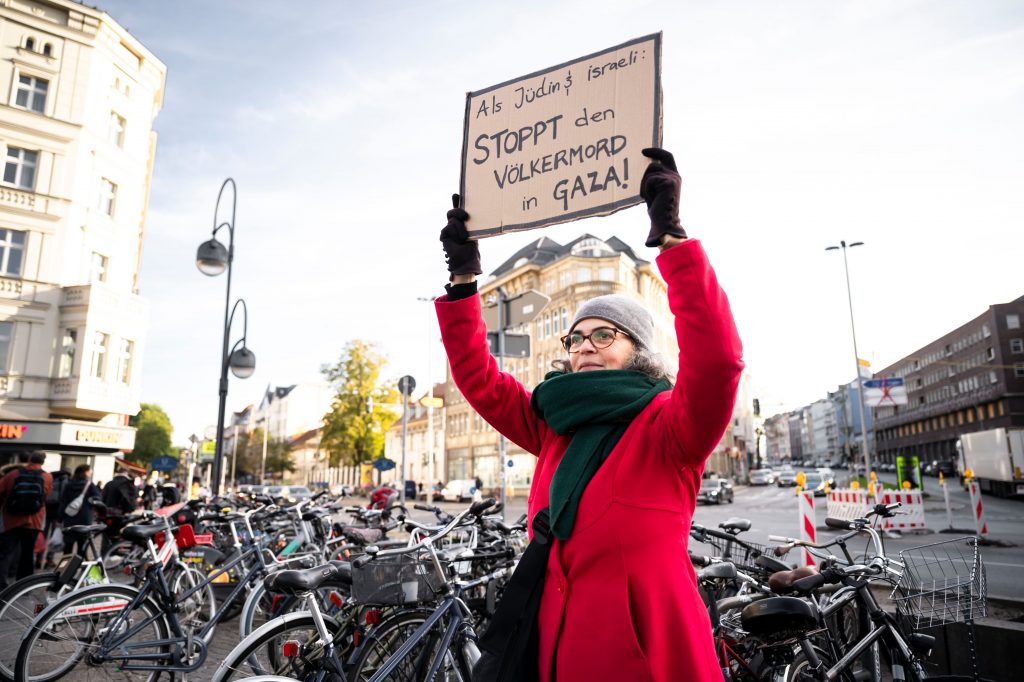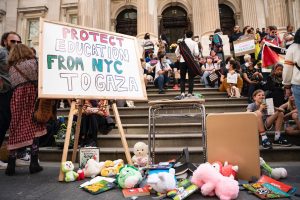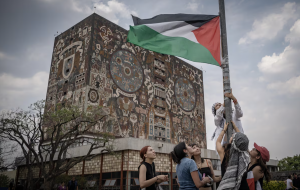German Chancellor Olaf Scholz has promised to protect Jewish life in Germany — that is the official justification for Germany’s unconditional support for Israel’s genocidal assault against Gaza. You are the chairperson of the association Jüdische Stimme (Jewish Voice) — are you being protected?
Not at all. This so-called protection doesn’t apply to actually existing Jews in all their diversity. It applies to a fixed notion of what Jewishness is and who Jews are. Official Jewish institutions are generally pro-Israel and the majority of Jews appearing in organised Jewish contexts are too, so that’s what’s being protected. The typical German perception of Jews is based on religion and Israel. The majority of our members are not religious either, and the idea of secular Jews is just as foreign to many Germans as non-Zionist Jews are. We’re more likely to be threatened by the police than by Palestinians or Muslims, since the state’s policy is to repress the Palestine solidarity movement and we’re part of that.
The Berlin Senate is shutting down the cultural center Oyoun, run by People of Color, because of “hidden antisemitism.” Your association had some experiences with Oyoun. Can you describe that?
Oyoun is a familiar name in the Berlin culture scene, and many of us have attended events there in the past. We first got in touch with them about holding our 20th anniversary event there back in July. It quickly became clear that the Berlin Senate would put obstacles in our path, since they told Oyoun to cancel the plans as soon as they found out. They threatened to cut their funding. There had been similar cases in the past, and Oyoun had given in to the blackmail. But they were determined to stand firm this time, even if they would have to pay a high price. We made it clear that we fully understood if they backed down, since going ahead could pose an existential threat to the center. But they felt both solidarity with our cause and a determination to reject the pressure that had been effective in silencing voices like ours in the past. We admire and appreciate their courage.
Germany has a network of non-Jewish Antisemitism Czars that are charged with stopping anti-Jewish hatred. They have a long record of accusing Jews of antisemitism for criticizing Israel. What is it like when German state officials call you an antisemite?
At first it’s baffling and outrageous, but the novelty wears off after a while. If you simply replace the word “antisemitic” with “anti-apartheid” or “anti-occupation,” it makes perfect sense. The notion of Jewish identity they have in their heads is one that has Israel as a central pillar, so if you reject what Israel does and represents, it means you reject Jewishness. That makes you an antisemite. It’s a basic and transparent logic, but it isn’t immediately clear to everyone because it seems so bizarre.
The next step is to understand how this association of Jews with Israel forms part of the national redemption narrative in Germany. If the Holocaust is the original sin of modern Germany, then the one thing that can temper that guilt is to support Israel, which is presented as the closest thing to a happy end after the Holocaust. Of course, many Jews do believe that it’s the one place we can go if the persecution starts again, and is therefore necessary. But the German angle is more specific and more solipsistic, since Germany’s redemption rests on Jewish safety, or at least an abstract and paternalistic version of it, which denies the oppression carried out supposedly in the name of that safety.
This is where Palestinians are a problem. They get in the way of the redemption narrative. They disturb the compensation process by stubbornly reminding the world that Israel was created through great injustice and continues to perpetrate crimes against Palestinians. The German establishment can’t tolerate that, it can’t even recognise it, since this would be a stain on its redemption process — which, by the way, was always about the country’s rehabilitation as a player in world politics too, not just about moral purification.
Jüdische Stimme has been organizing, alongside Palestinian groups, numerous demonstrations in solidarity with Gaza. The right-wing press says these demonstrations are full of “Jew haters.” What has your experience been?
I can’t read the mind of every participant at a demonstration, but I can say that we’re pretty public about who we are as a Jewish group. We give speeches in the organization’s name, we carry signs with our name, and what I’ve experienced when people approach us is appreciation for our message and our presence. They see that we’re part of the movement, that we’re there in solidarity, so that’s how we’re perceived. Some people are surprised, since it’s assumed that Jews generally support Israel and the Jewish establishment certainly does. But I haven’t encountered hostility myself.
The right-wing press presents chants like “from the river to the sea, Palestine will be free” or “child murderer Israel” as expressions of Jew hatred, so their criteria are different from ours. Pro-Israel Jews would obviously feel less comfortable at the demonstrations, but that’s a political issue, not a religious or ethnic one.
With Oyoun being shut down, it is becoming more and more difficult to find spaces where Jewish organizations that are not in line with Germany’s Staatsräson can hold events. Is the German government restricting Jewish life in Germany?
Definitely, or at least it’s trying. Because racism is a major factor in all this, both towards Muslims in particular and non-European migrants in general, the establishment can’t really deal with the idea of multiculturally oriented Jews who interact with those minorities and perhaps even relate to them more than to the white German majority. They’ll mostly go after the POC-run spaces, like Oyoun or more recently Café Karanfil, which was raided by the police on highly specious grounds. But we’re targets too as long as we associate with them. And, as the scandal around our anniversary event demonstrated, being associated with us can also be dangerous for them.
Members of Jüdische Stimme have been arrested, fired from their jobs, and censored. Do you consider this repression a form of modern antisemitism?
Yes, I do. Not in the sense that we’re targeted for being Jews — obviously the cops don’t ask about our identity before arresting us. What’s antisemitic is that we’re being told by the German establishment how to be Jews, which involves supporting Israel. They don’t think about the full implication of the assumption that we need Israel as a safe space, which is that we’ll never be safe here, and that emigration is the only real solution to antisemitism.
I think life in Israel — and not only since October 7 — demonstrates that it’s safer to be Jewish in Europe, even if it’s a boost for some to be the majority for a change. In any case, would this logic be applied to any other minority? It makes a mockery of anti-racism and anti-discrimination in general. Obviously plenty of Jews hold these views without non-Jewish Germans imposing them, but it’s for us to decide what political position we take — on Israel or any other issue — and not for Germany to tell us what we should think or do.











